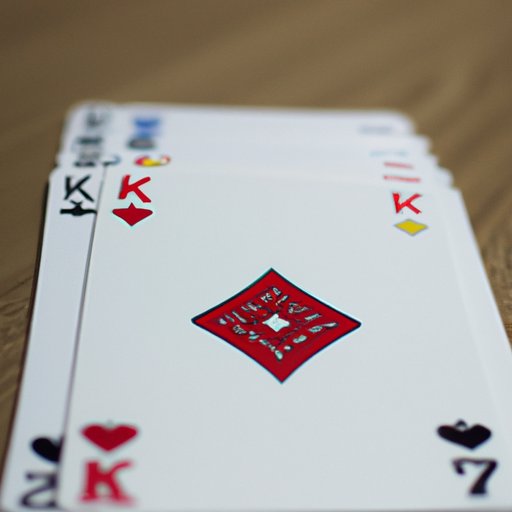Introduction
Poker is one of the most popular card games in the world. It’s been around for centuries, with the first recorded game being played in 1829. The game has evolved over time, but the premise is still the same: players try to make the best hand they can by combining their cards with community cards dealt on the table. Poker requires a combination of luck and skill, as players must be able to read their opponents, bluff when needed and make the right decisions at the right time.
What is Poker?
Poker is a card game where players compete against each other to make the best hand. It’s typically played with a standard 52-card deck, and there are several variations of the game. In most forms of poker, each player is dealt two cards face down (known as the “hole cards”) and then five community cards are dealt face up on the table. Players can use any combination of the seven cards available to them to make the best hand possible.
Why Should You Learn How to Play?
If you’re looking for a fun and exciting way to test your skills and challenge yourself, poker is a great choice. Not only is it a lot of fun to play, but it also helps improve your decision-making, analytical and strategic thinking skills. Additionally, playing poker can be a great way to meet new people and develop friendships.
The Rules of Poker
Before you start playing poker, it’s important to understand the basic rules of the game. Here are some of the key terms and concepts you should know:
Basic Rules of the Game
In Texas Hold’em, the most popular form of poker, each player is dealt two hole cards and then five community cards are dealt face up on the table. At the end of the round, the player with the best five-card hand wins the pot.
Betting Terms and Concepts
In poker, there are several different betting terms and concepts you should be familiar with, such as “check,” “raise,” and “fold.” “Checking” means passing on your turn without betting; “raising” means increasing the amount of the bet; and “folding” means giving up and forfeiting your cards and any money you’ve already bet.
The Different Types of Poker Games
There are several variations of poker, including Texas Hold’em, Omaha, Seven Card Stud, Five Card Draw and more. Each variation has its own set of rules, so it’s important to familiarize yourself with the rules of the specific game you’re playing.
How to Play Poker
Once you understand the basic rules of poker, you can start learning how to play the game. Here’s a step-by-step guide to playing:
Step-by-Step Guide to Playing
1. The dealer shuffles the cards and deals each player two hole cards.
2. Starting with the player to the left of the dealer, each player has the option to call, raise or fold.
3. The dealer then deals three community cards face up on the table (known as the flop).
4. Starting with the player to the left of the dealer, each player has the option to check, bet or fold.
5. The dealer then deals two more community cards face up on the table (known as the turn and river).
6. Starting with the player to the left of the dealer, each player has the option to check, bet or fold.
7. The player with the best five-card hand wins the pot.
Tips and Strategies for Beginners
If you’re just starting out, here are a few tips and strategies to keep in mind:
- Start out slow and don’t be afraid to fold if you don’t have a good hand.
- Pay attention to your opponents and watch for tells.
- Know when to bluff and when to back off.
- Don’t be afraid to ask questions and learn from experienced players.
Benefits of Playing Poker
Playing poker isn’t just about winning money – there are several other benefits of playing the game. Here are some of the most notable ones:
Building Mental Strength
A study conducted by the University of Alberta found that playing poker can actually help improve cognitive abilities. The study showed that playing poker can help increase problem-solving skills, creativity and memory. According to Dr. Mike Dixon, the lead researcher of the study, “Poker is a complex game, and it requires players to think strategically, which can help sharpen their cognitive skills.”
Social Aspects of the Game
Playing poker is a great way to socialize and meet new people. Whether you’re playing online or in person, you can build relationships with other players and learn from their strategies. Poker can also be a great way to spend quality time with friends and family.
Financial Gains
While playing poker shouldn’t be viewed as a get-rich-quick scheme, it can be a great way to make some extra money. With practice and dedication, you can become an advanced player who can make consistent profits. Plus, playing poker can help teach you valuable lessons about managing finances and making smart investments.
Conclusion
Poker is a thrilling card game that has been around for centuries. Whether you’re playing for fun or for money, understanding the basics of how to play will help you get the most out of the game. From building mental strength to making financial gains, there are many benefits to playing poker.
(Note: Is this article not meeting your expectations? Do you have knowledge or insights to share? Unlock new opportunities and expand your reach by joining our authors team. Click Registration to join us and share your expertise with our readers.)
